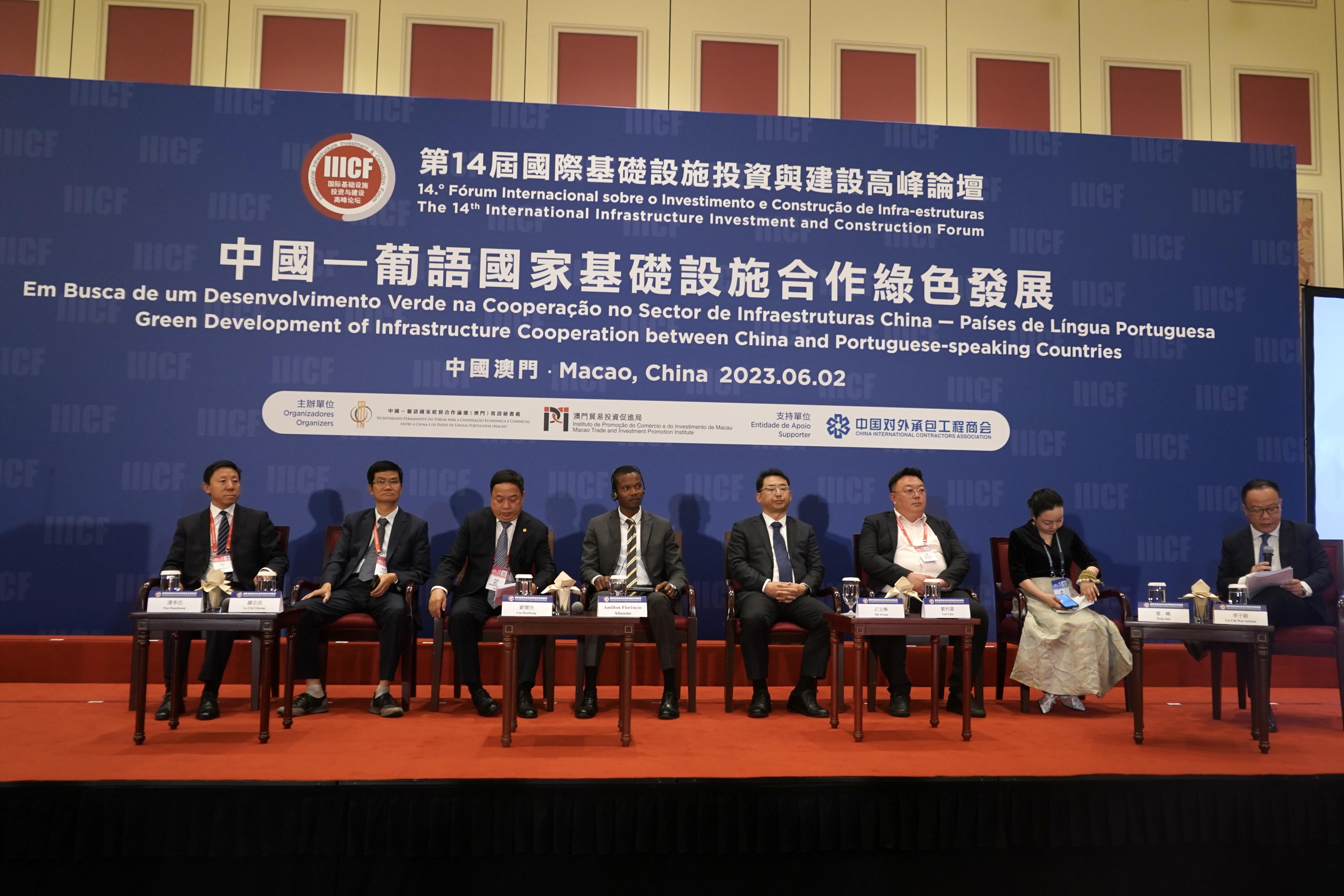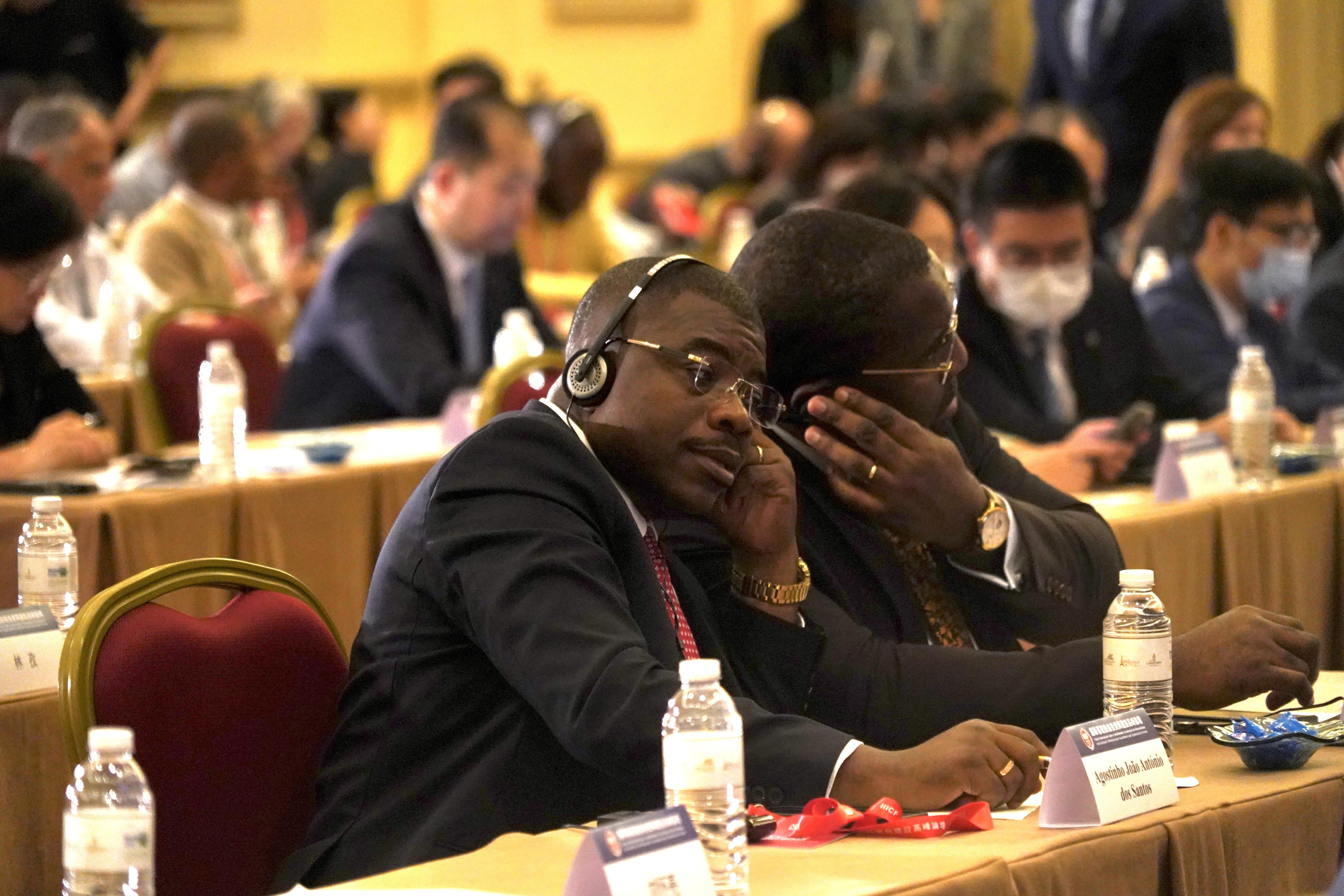 Speakers share their insights during the panel titled “Green Development of Infrastructure Cooperation between China and Portuguese-speaking Countries” at the 14th International Infrastructure Investment and Construction Forum in Macao on Friday. (Li Xiang / China Daily)
Speakers share their insights during the panel titled “Green Development of Infrastructure Cooperation between China and Portuguese-speaking Countries” at the 14th International Infrastructure Investment and Construction Forum in Macao on Friday. (Li Xiang / China Daily)
The economic and trade collaboration between China and Portuguese-speaking countries continues to grow and is proving resilient, paving the way for deeper infrastructure cooperation between the two sides, experts noted at a forum held on Friday.
The event, titled “Green Development of Infrastructure Cooperation between China and Portuguese-speaking Countries”, was one of 10 parallel forums held on the second day of the 14th International Infrastructure Investment and Construction Forum (IIICF) in the Macao Special Administrative Region.
Speakers were invited to explore ways to strengthen cooperation in green technology, the digital economy, green finance and clean energy, with the goal of stimulating low-carbon growth of infrastructure in the Chinese mainland, Macao SAR and Portuguese-speaking countries, and sharing opportunities in developing new projects.
In his opening remarks, Ji Xianzheng, secretary-general of the Permanent Secretariat of the Forum for Economic and Trade Co-operation between China and Portuguese-speaking Countries (Macao), said that infrastructure development has always been one of the key areas that Forum Macao focuses on, and the action plans previously signed at ministerial-level meetings have always covered infrastructure collaboration.
Ambassador Maria Gustava, head of Portuguese-speaking countries’ diplomatic corps in China, said that China continues to expand exchanges and cooperation with Portuguese-speaking countries in the field of infrastructure, especially in the areas of transportation, health, agriculture and tourism services, etc.
“We believe we need to broaden our investment horizons even further, continuously stimulating post-pandemic economic recovery,” she said.
“We believe we need to broaden our investment horizons even further, continuously stimulating post-pandemic economic recovery.” — Maria Gustava, head of Portuguese-speaking countries’ diplomatic corps in China
She added that Portuguese-speaking countries attach great importance to making full use of Macao as a platform from which to seize other development initiatives and opportunities in the Guangdong-Hong Kong-Macao Greater Bay Area, and to enhancing economic and trade relations between themselves and China.
 The two-day event attracted more than 3,000 delegates from over 60 countries and regions, including more than 40 ministerial-level officials and senior executives of financial institutions. (Li Xiang / China Daily)
The two-day event attracted more than 3,000 delegates from over 60 countries and regions, including more than 40 ministerial-level officials and senior executives of financial institutions. (Li Xiang / China Daily)
Vincent U, president of the Macao Trade and Investment Promotion Institute, noted the Macao SAR has made great use of its commercial and trade ties with Portuguese-speaking countries, and has linked up with the neighboring Guangdong-Macao Intensive Cooperation Zone in Hengqin. Also, progress has been made in how to further leverage Macao’s platform and bridge advantages, he added.
He also expressed hopes for grasping new opportunities for Macao to play its role well as a platform between the Chinese mainland and Portuguese-speaking countries, especially in furthering trade and investment collaboration between both sides.
Lo Chi Cheong, president of the 10th council (2020-2023) of Macau Construction Association, said that when pursuing the common goals of green development and carbon neutrality, China and Portuguese-speaking countries need to cooperate on an environmentally conscious basis, rather than focus solely on economic gains or benefits.
“The aim should be to achieve sustainable development in infrastructure collaboration, through strengthening green technology exchanges, development policies, the cultivation of talents, and international cooperation,” he said, adding that Macao’s contractor community would give full support to this.
Pan Duozhong, executive officer of CHN-HK Construction Project Management Research Centre, stressed the importance of having unified data standards and data sharing in the process of international infrastructure collaboration. He noted that data-related technologies such as BIM and GIS, widely used in recent years, are foundational to green technology and the digital economy in the field of infrastructure development.
The event was moderated by Li Ziwei, director of the Economic Development Bureau of the Guangdong-Macao In-Depth Cooperation Zone.
Contact the writer at vivienxu@chinadailyapac.com
